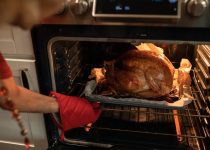Your Essential Guide to Public Grilling Safety
Are you ready to fire up the grill and enjoy some delicious outdoor cooking?
Before you do, make sure you’re equipped with the essential guide to public grilling safety.
In this article, we’ll show you how to:
- Choose the right location
- Handle propane tanks safely
- Prevent fire hazards
- Ensure proper food handling and cooking
- Clean up responsibly.
So grab your apron and get ready to grill with confidence!
Key Takeaways
- Choose a well-ventilated location away from flammable materials and follow local regulations and restrictions on public grilling.
- Handle and store propane tanks safely by transporting them upright, securing them tightly in the vehicle, and storing them outdoors in a well-ventilated area away from open flames or heat sources.
- Prevent fire hazards by placing the grill on a stable and non-flammable surface, keeping a fire extinguisher and bucket of sand or water nearby, and regularly cleaning the grill to remove grease buildup.
- Ensure proper food handling and cooking by keeping raw meats separate from other foods, monitoring internal food temperatures using a meat thermometer, and properly disposing of perishable food leftovers to prevent foodborne illnesses.
Choosing the Right Location
Choose a location that’s safe and suitable for grilling in public.
When it comes to outdoor grilling, safety precautions should always be a top priority. Before firing up the grill, make sure you select a location that’s well-ventilated and away from any flammable materials. Look for a spot that’s level and stable, so your grill won’t tip over. Avoid areas with low hanging branches or overhangs that could catch fire.
It’s also important to choose a location that isn’t too close to other people or buildings, as this can pose a serious fire hazard. Additionally, be mindful of any local regulations or restrictions on public grilling in your area. Some parks or public spaces may have designated grilling areas or specific rules that you need to follow.
Handling Propane Tanks Safely
When grilling in public, ensure your safety by properly handling propane tanks. Propane tanks are a crucial component of your grilling experience, but they can also pose a safety risk if mishandled. To help you handle propane tanks safely, follow these guidelines for transporting and storing them:
Transporting Propane Tanks
- Always transport propane tanks in an upright position to prevent leaks and ensure stability.
- Secure the tank tightly in your vehicle to prevent it from rolling or tipping over during transportation.
- Never leave propane tanks unattended in a parked vehicle, especially in hot weather, as high temperatures can cause pressure to build up inside the tank.
Storing Propane Tanks
- Store propane tanks outdoors in a well-ventilated area away from any open flames, heat sources, or combustible materials.
- Keep propane tanks away from direct sunlight and extreme temperatures, as they can affect the pressure and integrity of the tank.
- When not in use, close the valve tightly on the propane tank to prevent leaks and potential hazards.
Preventing Fire Hazards
To prevent fire hazards while grilling in public, ensure you’re aware of and follow proper safety precautions. Outdoor precautions are essential to maintain a safe grilling environment. First and foremost, make sure your grill is placed on a stable and non-flammable surface, away from any combustible materials such as dry leaves or overhanging branches. Keep a fire extinguisher nearby, as well as a bucket of sand or water, in case of emergencies. It’s also important to regularly clean your grill, removing grease buildup that could ignite and cause a fire.
Emergency preparedness is crucial when grilling in public. Before starting the fire, make sure you have a plan in case of an emergency. Familiarize yourself with the location of the nearest emergency exits and know how to use them. Keep a first aid kit handy, equipped with burn ointment and bandages, to treat any minor injuries. Additionally, establish a communication plan with your group to ensure everyone knows what to do in case of an emergency.
Ensuring Proper Food Handling and Cooking
Proper food handling and cooking are essential for ensuring a safe grilling experience in public. One of the key aspects of food safety is ensuring cross contamination prevention. This means keeping raw meats separate from other foods to avoid the transfer of harmful bacteria. When packing your ingredients for the grill, make sure to use separate containers or bags for raw meats and other perishable items. It’s also important to use different utensils and cutting boards for raw and cooked foods. This simple step can significantly reduce the risk of foodborne illnesses.
Another crucial factor in food safety is monitoring internal food temperatures. This helps ensure that the food is cooked to the appropriate temperature to kill any harmful bacteria. Invest in a reliable meat thermometer and use it to check the internal temperature of your grilled meats. The USDA recommends the following internal temperatures for commonly grilled foods: 145°F for steaks, roasts, and fish; 160°F for ground meats; and 165°F for poultry. By following these guidelines, you can be confident that your food is safe to eat.
Cleaning Up and Leaving No Trace
Make sure to clean up after yourself and leave no trace when grilling in public. Not only is it courteous to others who may use the grilling area after you, but it also helps to protect the environment.
To ensure environmentally friendly practices, start by properly disposing of your ashes. Allow them to cool completely before transferring them to a metal container. Avoid using plastic bags or containers that can melt or catch fire. Once the ashes are safely contained, dispose of them in designated areas or follow any specific guidelines provided by the park or facility. Remember to never dump ashes in trash cans or near vegetation, as they can pose a fire hazard.
Additionally, clean the grill grates and surfaces with a grill brush or scraper to remove any leftover food debris and grease. Dispose of the waste in designated trash bins or take it home with you.
Frequently Asked Questions
Can I Use My Own Grill in Public Parks or Beaches?
Yes, you can use your own grill in public parks or beaches, but it’s important to follow public grilling regulations and practice grilling safety tips to ensure a safe and enjoyable experience for everyone.
Is It Safe to Grill in Windy Conditions?
Grilling in windy conditions can be risky. Remember grilling safety tips and take precautions. Secure your grill, use a windscreen, and keep a close eye on the flames. Stay safe while enjoying your outdoor cooking!
Are There Any Restrictions on the Types of Food I Can Grill in Public Spaces?
When grilling in public spaces, there are regulations regarding the types of food you can grill. It’s important to follow safety precautions to ensure everyone’s well-being.
Can I Bring My Own Charcoal or Do I Have to Use the Provided Grilling Materials?
You can bring your own charcoal to public events and use your personal grill. You don’t have to use the provided grilling materials. Enjoy the freedom to grill with your preferred equipment.
What Should I Do if There Is No Designated Grilling Area in a Public Space?
If there’s no designated grilling area in a public space, consider safer alternatives like portable grills or electric grills. Make sure to follow safety precautions, such as keeping a safe distance from flammable objects and having a fire extinguisher nearby.



